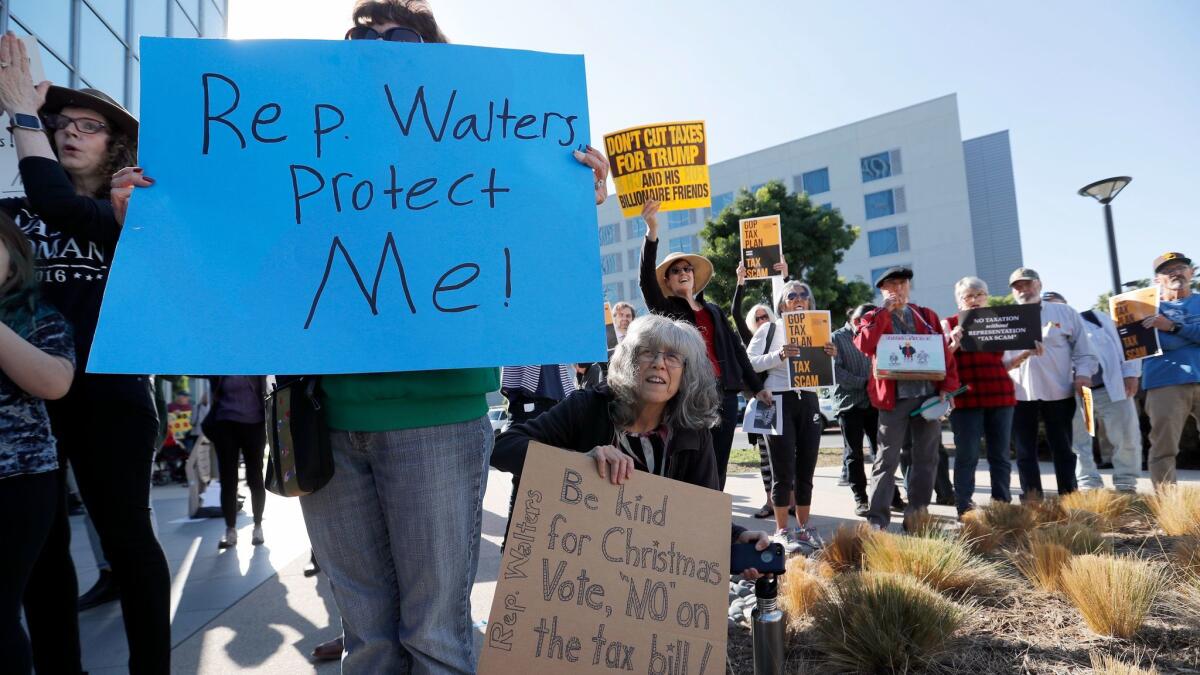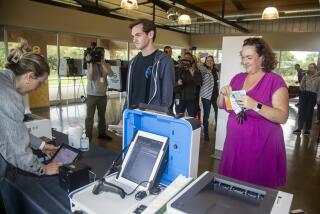The GOP tax plan passed. Now Democrats have another big issue to use in the midterms

As GOP leaders in Congress met behind closed doors to hash out the details of their massive tax overhaul, a group of UC Irvine graduate students met in Rep. Mimi Walters’ district, fretting about how the plan could cost them money.
About 20 miles north, dozens of activists in top hats stood outside Rep. Ed Royce’s Brea office as they chanted, “Shame on you!”
And up in the Central Valley, protesters gathered outside Rep. Jeff Denham’s Modesto office to sing “Protest ye dreary congressman … Remember that he voted to take healthcare away. To save himself from taxes now, so you will have to pay.’
With the tax bill on its way to President Trump and Republicans nationwide claiming victory as they decamp to their districts for the holidays, Democrats are hoping California Republicans will have to answer in next year’s midterms for their support of the unpopular effort to abolish the Affordable Care Act, backed by all 14 California Republicans in May, and now, the sweeping tax overhaul that passed Tuesday with support from 12 of them.
“The actual impact on the household budgets of middle-class voters and families in California is such total economic despair,” said Katie Merrill, a Democratic strategist who helps lead the political action committee Fight Back California, which has run ads targeting GOP members on economic issues. “We … are going to tell voters in every one of these districts exactly what the impact on them is going to be.”
Some of the bill’s effects will be felt quickly as employers modify how much in taxes they withhold from people’s paychecks, though most taxpayers won’t get a complete view of what the bill means for them until 2019 when they file their 2018 returns. Analysts expect taxes to initially go down for many Californians because of temporary cuts in the bill. But a significant number of residents are also likely to see a tax hike because of new caps to popular deductions.
In districts that have been shifting toward Democrats and where challengers and left-leaning groups have been attacking the plan as a huge hit to the middle class, GOP members’ tax votes are likely to exacerbate their problems as Republicans try to maintain control of the House.
A recent statewide poll by the nonpartisan Public Policy Institute of California found that 62% of likely California voters oppose the tax reform plan. The tax vote’s potential as a campaign issue is even more clear at the party level: 58% of Republicans favor it, but 84% of Democrats and 59% of independents are opposed.
“It definitely is a political land mine for some of these members, on top of all the other challenges they’re facing as the ground is shifting under their feet in the Trump era,” said Kyle Kondik, managing editor of Larry Sabato’s Crystal Ball at the University of Virginia Center for Politics, a nonpartisan election handicapper.
So why did so many California Republicans support it anyway? National Republicans needed a win after ultimately failing to overhaul Obamacare, which took up most of the year and failed in the Senate. To get the tax legislation over the finish line, Republican members put themselves in a precarious position of voting for a bill that could raise taxes on their constituents because of slashes to widely used deductions for state and local taxes and mortgage interest.
The tax bill appeared to cause the most heartburn for vulnerable Southern California Republicans whose districts face some of the deepest effects, according to a Times analysis. All four GOP members considered vulnerable in Orange County represent districts where between 40% and 50% of constituents took advantage of the deduction for state and local taxes.
Two of them — Dana Rohrabacher of Costa Mesa and Darrell Issa of Vista (a small part of his district is in southern Orange County) — voted against the plan.
Rep. Walters spent weeks pressing House leaders to change the bill to lower the burden on her constituents before deciding to support it. She said she believes that changes to the deductions and subtle tweaks to the income ranges would mean a tax cut for her constituents.
“I campaigned on tax reform. I’ve always been a big proponent that we need to have tax reform in this country, and I think we have a very good package that we are presenting to the American people,” she said.
Vulnerable California Republicans who voted yes seem to recognize the political risk, but said it couldn’t be a determining factor.
Rep. Steve Knight of Palmdale said Democrats are trying to win votes by making people scared of the tax bill, but when voters actually see how it affects them, opposition will drop.
“The numbers are pretty goldarn clear. When they sit down with their numbers, with their [accountant] or by themselves, I think they are going to see a difference [from] this narrative,” Knight said.
The American Action Network, a conservative nonprofit linked to House Speaker Paul D. Ryan (R-Wis.), has runads in California praising wavering members for supporting the legislation that would create “a simpler, fairer tax code that cuts middle class taxes.”
Corry Bliss, executive director of the group, said its work to advance that narrative is just beginning. “We have to explain to people what this does and how this helps them.… If there’s a way to sign a contract that says we’ll base the entire midterms on whether or not these people like this tax deal, I would sign that deal today.”
But so far, liberal groups have dominated the messaging on the bill in California, casting it as a giveaway to the rich and another example of how GOP members are out of touch with constituents.
“We aren’t just angry, … – we’re FURIOUS!!” read one fundraising blast from Red to Blue California, which urged its supporters to join them to “make them pay – with their seats in Congress.”
Michael Eggman, a Democrat who ran against Rep. Denham last year and is Red to Blue’s founder, said his group saw a 15% bump in donations from October to November, just as the tax bill debate was heating up. Eggman’s group and others blanketed California’s airwaves and digital real estate with ads decrying the “billionaire tax cuts.”
“We’re going to keep on banging this tax plan drum, of course, because it hurts the people we are really trying to give voice to, the middle working class,” Eggman said. And, he added, the bill is “certainly making it easier for me to grow my organization.”
Not One Penny spokesman Tim Hogan said activists will use it to bring voters to the polls the same way that Republicans used the Affordable Care Act in 2010, which had just been passed, but didn’t go into effect for several years.
Activists will work to make sure people know that “regardless of when these provisions go into effect, the light at the end of this tunnel is a train with a tax hike for middle-class families,” he said.
Democratic candidates running against Republican members across the state have also used it to make fundraising appeals or build their supporter lists. Back in Orange County, challenger Dave Min, a Democrat who’s running against Walters, was direct.
“You all know this bill is going to screw you,” he told the group of graduate students he gathered for a discussion over pizza.
Deyanira Nevarez Martinez, a 32-year-old student who showed up to Min’s event, has resolved to knock on doors and make phone calls for Democrats in Orange County next year.
“I think the fact that [Republicans] showed they are willing to go there should be a wake-up call for all of us,” she said.
christine.maiduc@latimes.com and sarah.wire@latimes.com
For more on California politics, follow @cmaiduc and @sarahdwire
ALSO
Updates on California politics
More to Read
Get the L.A. Times Politics newsletter
Deeply reported insights into legislation, politics and policy from Sacramento, Washington and beyond. In your inbox three times per week.
You may occasionally receive promotional content from the Los Angeles Times.








